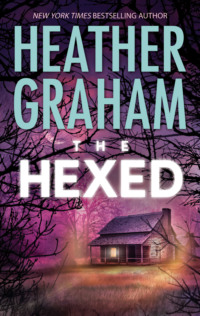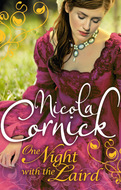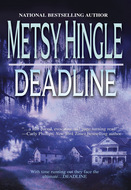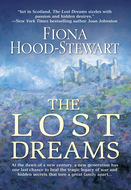Raamatut ei saa failina alla laadida, kuid seda saab lugeda meie rakenduses või veebis.
Loe raamatut: «The Hexed»
A place of history, secrets…and witchcraft.
Devin Lyle has recently returned to the Salem area, but her timing couldn’t be worse. Soon after she moved into the eighteenth-century cabin she inherited from her great-aunt Mina—her “crazy” great-aunt, who spoke to the dead—a woman was murdered nearby.
Craig Rockwell—known as Rocky—is a new member of the Krewe of Hunters, the FBI’s team of paranormal investigators. He never got over finding a friend dead in the woods. Now another body’s been found in those same woods, not far from the home of Devin Lyle. And Devin’s been led to a third body—by…a ghost?
Her discovery draws them both deeper into the case and Salem’s rich and disturbing history. Even as the danger mounts, Devin and Rocky begin to fall for each other, something the ghosts of Mina and past witches seem to approve of. But the two of them need every skill they possess to learn the truth—or Devin’s might be the next body in the woods.…
Praise for the novels of New York Times bestselling author Heather Graham
“Graham does an amazing job of bringing real-life elements into her fiction worlds… [The] messages are subtle, expertly woven through a story that focuses on solving mysterious crimes using the Krewe members’ unique talents.”
—RT Book Reviews on The Night Is Forever (Top Pick)
“Bestseller Graham launches the third arc in her paranormal romantic suspense Krewe of Hunters series (The Unseen, etc.) with a rousing tale of the intriguing haunted town of Lily, Arizona…. Readers will enjoy Sloan and Jane’s interactions as romantic partners and competent professionals, aided by Lily’s ghosts.”
—Publishers Weekly on The Night is Watching
“Graham deftly weaves elements of mystery, the paranormal and romance into a tight plot that will keep the reader guessing at the true nature of the killer’s evil.”
—Publishers Weekly on The Unseen
“I’ve long admired Heather Graham’s storytelling ability and this book hit the mark. I couldn’t put The Unholy down.”
—Fresh Fiction
“The main characters are a great team, both professionally and romantically.”
—RT Book Reviews on The Unspoken
“Graham does a great job of blending just a bit of paranormal with real, human evil.”
—Miami Herald on Unhallowed Ground
“Graham’s narrative never lags for even a single paragraph, and her setting...is a fascinating and compelling one. The ending is a heart-stopping surprise that her fan base and reading groups will be discussing for months.”
—Bookreporter.com on The Dead Room
“Graham stands at the top of the romantic suspense category.”
—Publishers Weekly on Phantom Evil
The Hexed
Heather Graham
To Pearl Riley and Kelly Riley
with lots of love and thanks.
Contents
Cover
Back Cover Text
Praise
Title Page
Dedication
Prologue
Chapter 1
Chapter 2
Chapter 3
Chapter 4
Chapter 5
Chapter 6
Chapter 7
Chapter 8
Chapter 9
Chapter 10
Chapter 11
Chapter 12
Chapter 13
Chapter 14
Chapter 15
Chapter 16
Chapter 17
Chapter 18
Chapter 19
Chapter 20
Extract
Prologue
“Help me, Rocky! Help me!”
Craig Rockwell—Rocky to family and friends—was seventeen, a high school senior. It wasn’t that he didn’t like Melissa Wilson; he just wasn’t interested the way she was interested.
He rolled over restlessly on the bed, her voice—frantic as always—pushed to the background as his half-sleeping mind returned to the thoughts that had occupied him earlier as he’d drifted off over homework.
He’d been waiting to leave here as long as he could remember. He wanted to head to Boston or New York. Not that there was anything wrong with Peabody, Massachusetts. It was fine. It was filled with old houses, history and die-hard Yankees, though sometimes the people around him seemed uptight. He’d been drilled in the history of Pilgrims and Massachusetts all his life, so maybe—since many of the people in the area were descendants of the Puritans who had first settled in the state—it was natural that people here took a wicked long time to progress.
He played football, and he was good. Six-one, strong and sleek and quick, he had set his mind on being the best quarterback possible, and it looked as if he was going to have his choice of scholarships. But that meant hanging in and hanging tough with football and his grades. He was lucky, too. Well, lucky in a way. He had leading-man looks, and when the school drama club was doing The Crucible, he was cast as John Proctor. He would give all of it up, though, to have his dad back.
On Friday nights when training was over, he met up with friends and they went to a movie or sat around a coffeehouse, or occasionally went into Boston for a concert. It was the same group of friends he’d hung out with forever. Haley Marshall, who he’d more or less gone out with until they’d recently called it quits; Jack Grail, lineman; Vince Steward, guard; Renee Radcliff, captain of the cheerleading squad—and Melissa.
They’d known one another since they were kids.
Peabody was fairly small. Population just about fifty thousand, give or take a thousand or two. The town had once been part of Salem, but it had become a separate entity as time went by and the world grew. But there was more out there, and he intended to see it.
He was good, and he wanted to make the pros. If he didn’t make the pros, he wanted to join the FBI. While his mother could trace her family back to the damned Mayflower, his father had hailed from Texas, where he’d been a sheriff. Late in life he’d fallen in love with Rocky’s mom, so he’d been almost seventy a year ago when he’d died of a heart attack. The pain still assailed Rocky often, but he was grateful for his father. It had been better to have him for sixteen years than anyone else for a lifetime.
And he was definitely going to be a lawman, with or without a football career first. FBI. An agent had come to town when he’d been ten and spoken to an assembly, and he’d known since then that was what he wanted to be.
The sound of Melissa’s voice rose, interrupting his restless thoughts.
“Rocky!”
There was a sudden banging at his bedroom window. He started and sat up, staring. Melissa was there, her face white. He couldn’t hear her anymore, but when her lips formed a word he knew what she was saying.
Rocky.
His name, nothing more.
He heard more banging and realized it was coming from the front door. He leaped out of bed and checked the clock. It was still early, just after 8:00 p.m.
He looked back to his bedroom window, but no one was there.
Too many teen slasher movies, he decided. They were fun, though. The girls crawled all over you after a slasher movie, and Haley, completely at home with her sexuality, had been no exception, for which his raging hormones would be eternally grateful. But she had realized he was really planning on leaving, while she just wanted to get married and have babies, so now when the movie ended she was all over Vince or Jack as she tried to figure out who was the best candidate for marriage and settling down.
He didn’t care—he knew he wasn’t what Haley wanted. He just didn’t like it that now Melissa Wilson, apparently with Haley’s blessing, was yearning after him all the time.
It was odd, he thought. If it was slasher movies that unnerved him, it should have been some kind of a homicidal monster at his window. A killer in a human skin mask or something. Instead, he saw the face of Melissa Wilson. She was five-three and a hundred pounds, tops. Not too scary.
Whatever. She was gone. And the banging at the front door continued. He got up and went to see what was going on.
It was Vince. “Hey, man,” his friend demanded, “your mom’s working late?”
His mother was a “vice president” at a small ad agency. In reality she was a glorified assistant with a title instead of a decent salary.
“Yeah,” he told Vince. “They’re shooting that Welcome to Salem ad tonight—in Peabody.”
“Close enough, I guess. I got a couple of beers. Come on out—we’ll hang in the truck, and that way we can toss ’em quick if she shows up,” Vince said.
Rocky shook his head. “My mom can smell beer a mile away.”
“Chicken!”
“Yeah, well, that and our English test is tomorrow, and I have to ace it,” Rocky said.
“Wow. Some wild and crazy hotshot you are,” Vince said.
Rocky shrugged. “You said you’re going to community college until you figure out what you want to do. Well, I know what I want.”
“NYU or Harvard,” Vince said, grinning. “Maybe Yale.”
“Notre Dame. But, hey, I’ll sit in the back of the truck and watch you down a few.”
Vince shrugged. “Suit yourself.” Vince was huge. Six-four, close to three hundred pounds. He was great to have on the football field. He might have taken it somewhere—he just didn’t have the ambition.
“I don’t get you, buddy,” Vince said, opening the back of his Ford pickup and crawling into the bed.
As he did so, another car drove up. It was an ancient Toyota. Best Jack could buy, and then only with his dad’s help.
“Hey!” Jack called. He wasn’t as big as Vince; he was lean, with wiry muscles.
“Come and join us—back of the pickup,” Vince said as Jack got out and greeted them with a grin. “Haley hasn’t got you cornered?”
“Don’t know what’s up. I think the girls were going shopping. Now hand me a beer.”
“See, Rocky? That’s what boys do when the girls aren’t around—they drink beer and watch football,” Vince said.
“There aren’t any games on,” Rocky reminded him.
“Okay, so we settle for drinking beer,” Vince said.
“School night,” Rocky said. “And I have plans to get out of this town.”
Vince looked at Jack and Rocky, grinning. “Rocky, you got it all wrong. Peabody is a great place. Close to the action in Boston when you want action. Away from people when you don’t want a crowd.”
Jack laughed. “I think you’re talking about the wheat fields of Kansas or something. We have neighbors almost on top of us.”
Vince popped a beer and lay back on one of the plastic cushions he kept in the truck for “entertaining,” as he called it, looking up at the sky. “Yeah, in some places you got old Victorian on top of old Victorian. But there’s still some wooded land available. And reasonably priced, too. I get some trust money when I graduate, and I’m buying land.”
“To do what?” Rocky asked.
“I don’t know yet—I just know I’m buying it.”
“Yeah, well, I don’t have any trust money coming,” Rocky told him. He crawled up into the bed of the truck, but he didn’t lie back.
“Witch’s moon,” Jack said.
It was huge and full, Rocky noticed. The local Wiccans were probably all out forming circles or whatever it was they did.
“Werewolves a-howling,” Vince said, laughing.
Rocky frowned, listening intently. Just as Vince had spoken, he could have sworn that he did hear something. Not a howl, exactly. More like a sob.
“What was that?” he murmured.
“You hear a werewolf?” Vince laughed.
“No,” Rocky said, glancing at Vince and rolling his eyes. “But something. Shut up and listen.”
Melissa. Melissa Wilson. She was calling his name again. She was trying to tell him something.
Help me, Rocky. Help me!
“Don’t you hear her?” he demanded, looking around. His next-door neighbor’s house was close—not fifty feet away. The sound, however, seemed to be coming from farther than that. He gazed toward the playground across the street and beyond...where a small forest of pines led down to the pond.
“Hear what?” Vince demanded.
“Melissa,” Rocky said. “I could swear I hear Melissa—and she’s calling for help.”
Vince laughed. “Melissa? What the hell are you talking about? I’m the one doing the drinking and you’re hearing things? You hear anything, Jack?”
Jack shook his head. He looked worriedly at Rocky. “You okay?”
“Yeah,” Rocky said. “I’m fine. I’m not hearing things. It’s Melissa, and she’s asking for help.”
“You’re crazy, man. The pressure is getting to you. Hell, you’d help yourself out if you’d have a beer,” Vince offered.
“He may be right,” Jack noted.
Rocky jumped off the bed of the truck and listened. He couldn’t really tell, but the voice seemed to be coming from across the street and...
From inside his mind.
He walked across the street, so intent he forgot to even look for traffic. Thankfully, it was a quiet neighborhood.
“Rocky, what the hell?”
Vince hurried after him, with Jack following behind.
Rocky sprinted across the grass and into the pines.
“Rocky, wait!” Vince gasped. He was bigger, but it was hard for him to run as fast. Jack was quickly catching up.
But Rocky kept going until he finally stopped in the maze of pines, holding his breath, listening.
Rocky!
Melissa’s voice again.
He walked through the trees, grateful for the full moon, whose light filtered through the branches. Branches reaching toward him like skeletal arms.
Yup. Too many slasher movies.
Fallen pine needles were brittle beneath his footsteps as he moved through the trees. Something brushed his face, and he almost gasped aloud before he realized it was just a spiderweb.
“Rockwell, where the hell are you going?” Vince yelled from somewhere behind him.
“Come on, man. What are you doing?” Jack demanded as the other two caught up to him. “You’re scaring me.”
Rocky didn’t know. He kept walking through the woods until he came to a barren circle surrounded by pines. A little area of dust and rock and bracken, and...
Melissa. Melissa Wilson.
She was lying on her back, arms and legs stretched straight out. She was staring up at the night sky, at the full moon. Her eyes, he realized, were frozen open.
A red line extended around her throat and dripped to the forest floor.
Melissa Wilson was dead.
* * *
“Mr. Rockwell?”
Rocky started. He’d been sitting in the front office of the Virginia office of the FBI special division called the Krewe of Hunters, waiting for his appointment with Jackson Crow. He was the assistant director of this branch of “special” investigations. The titular head of all the Krewe units was a man named Adam Harrison, but he was seldom seen. He seemed to “direct” from some kind of lofty haven.
The events that had filled his mind—as fresh as if they’d just happened, although they had been almost thirteen years in the past—faded with the sound of the receptionist’s voice. Until recently, he’d buried the memories of Melissa Wilson deep in the darkest recesses of his mind.
He’d forgotten about football after finding her. He’d concentrated on law enforcement in college and gone to work first with the Boston police, and then he’d made it into the FBI Academy and taken a position in L.A. after graduation. Since his mother had remarried—a great guy, a retired fireman—he didn’t suffer from the only-child guilt that would have made him feel he needed to be near her.
Over the past ten years, he’d learned that Hollywood really was a world of illusion, and that only made the area a hotbed for mayhem and murder.
And now...
And now here he was, seeking a new position with a vengeance. He’d followed the Krewe of Hunters for the past few years. His curiosity had been piqued from the first time he’d read about their cases—and heard the rumors in the field offices. No matter how the members of the special unit were mocked, they were also respected, because they had a batting average that was off the charts.
And that was what he needed now.
Because it had happened again. A murder so much like Melissa’s that it gave him chills—and practically in his hometown.
“Special Agent Crow will see you now.”
As Rocky walked into Crow’s office, the man rose to greet him. He’d known Crow was Native American, and he wasn’t surprised the man was tall and fit. He hadn’t expected him to be quite so striking, though. He studied the man he hoped would be his boss, and he knew that Crow was studying him in return.
“Sit down. I’ve been reading your file and the clippings that you sent about the case,” Crow said.
Rocky sat. “And?”
“I see that another woman has been discovered in circumstances exactly like the girl you found.”
“Swampscott this time,” Rocky said. “Practically next door.”
Crow looked gravely at Rocky. “You were personally involved with the original case as a teenager.”
“Yes.”
“Do you think that will affect your work?”
Rocky hesitated.
One wasn’t supposed to be emotionally involved in the field; it could jeopardize the ability to make the best decision possible in a tough situation.
He let out his breath. “Yes,” he admitted.
Crow looked back down at the file before him.
“This woman was left just as your friend Melissa was. Arranged in a very specific position—almost as if her body was meant to create a pentagram.”
“Five points,” Rocky agreed. “And there was a silver medallion lying on her chest—the same as in Melissa Wilson’s case.”
Crow leaned back, stared at him for a long moment, then nodded slowly.
“I’m assuming you’ve studied up on the Krewe of Hunters and that’s why you wrote to me.”
“Yes.”
“And of course, we’ve studied up on you, too.”
“I’m damned glad. I’m sure I wouldn’t have a chance here if you hadn’t.”
Crow actually smiled. He leaned forward and said, “My boss—our director, Adam Harrison—is like a magician. It will still take me about twenty-four hours to get you transferred over. But,” he said, looking up, “feel free to head on up to Massachusetts right away. I’ll inform you when the transfer goes through.”
He stood. Rocky did the same, and Crow held out his hand.
“Welcome to the Krewe of Hunters, Agent Rockwell.”
1
Every once in a while Devin Lyle couldn’t help herself. People did such outrageous things sometimes that she just had to step in.
She stepped forward, positioning herself a little closer to the group standing by the memorial so she could hear what they were saying.
“Burn, witch! Burn!” a young man said. Despite his words, he was actually reverently placing a flower on the bench dedicated to one of the victims of the witch trials.
“How horrible. I can’t even imagine burning to death,” an older woman said.
“Excuse me,” Devin said. “None of the condemned in Salem were burned. Nineteen were hanged, and one man, Giles Corey, was pressed to death.”
“Really?” The older woman sounded relieved. “Not that hanging must have been less than horrible, but to burn...” She shuddered.
“Almost any tour you take in Salem is going to tell you about the victims—and tell you that no one was burned,” Devin said. They were all staring at her, and she suddenly felt self-conscious. She wasn’t a tour guide, after all. She wrote sweet, fun children’s books about a slightly crazy “witch.”
But Salem was her home. And she hated the misinformation about it that spread far too frequently.
“I saw it in a movie,” a kid said, nodding sagely. “They burned them in the movie.”
“That movie took license with history, I promise you,” Devin assured him.
“And men were called witches, too? Not warlocks?” the older woman asked.
“Yes, they were all accused of being witches. And at the time, witchcraft was punishable by death,” Devin said. “So, if you ‘hexed’ a neighbor—just cursed him, or say you had a voodoo doll, whether there was any real magic there or not—you were considered a practicing witch and subject to execution.”
“So they were all guilty?” someone else asked.
“No, not all of them―you have to remember, even just saying that you had cursed someone was considered to be witchcraft. Kids would read their futures in broken eggs, and that was witchcraft, by the standards of the time. Those who were condemned and hanged refused to plead guilty, because they were innocent and feared for their souls if they did. During the hysteria, all kinds of crazy things happened. You really need to take a tour—or just start at the Witch Dungeon and get a good overview of the entire situation.
“People were at odds politically, creating an atmosphere ripe for petty arguments. It was winter, it was bitter cold and it was, frankly, miserable. Most scholars believe that the tales Tituba—a slave from the Caribbean—told to a group of girls started them making up their own stories. And since people not only believed fiercely in the devil but that he also lived in the woods, they...” Devin’s voice trailed off, and she smiled as she saw an old friend, Brent Corbin, standing nearby. He owned an occult and souvenir store on Essex Street, and led one of the best night tours of the city.
She could see that he was grinning at her, with a teasing light in his eyes. Brent was a little stout, but he had a cute thatch of blond hair, beautiful bright blue eyes and a great smile. He was clearly as bemused as she was by the conversation.
Ten years ago Brent had graduated with her from Salem High. They’d fought like crazy when they’d been kids, teased and tormented each other over dating as they’d gotten older, and now—especially with her living back in Salem—they laughed over their old squabbles. It had been great to spend time with him now that she was back to town, and no way was she letting him get away without an introduction.
“Hey,” she said, smiling. “We’ve got one of the city’s best tour guides right here. This is Brent Corbin. He owns Which Witch Is Which just over on the mall and no one—seriously, no one—knows Salem’s history better than Brent. I’ll leave you in his capable hands.”
She waved to him, laughing when the smile disappeared from his face. But then it was back, and he shook his head in amusement as he watched her go.
A few minutes later he sent her a text message. I’d throw you in the stocks for that—except half of them signed on for the tour tonight. Thx. See ya later.
Devin laughed and continued on to Essex Street, where one of her best friends carried Devin’s books in her shop, the Haunted Dragon. She not only carried books, but toys and Salem T-shirts, as well as finely made cloaks, clothing and jewelry. Beth Fullway was a practicing Wiccan. She had graduated a few years before Devin, then stayed in the area and, like Brent, opened a shop. She was open from 11:00 a.m. to 7:00 p.m. daily, with two employees to help her cover all the days of the week. When seven at night rolled around, she was done. Unless, of course, it was October and they were in the middle of Haunted Happenings. In Salem, Haunted Happenings was one of the year’s biggest events—a money event. People came in droves, and all the rules changed. Stores stayed open later, and there were more special tours, historical events, haunted houses and whatever other manner of “spooky” entertainment an up-and-coming entrepreneur could imagine.
A little bell tinkled when Devin went in; the store was about a thousand square feet, with curtained rooms in the rear where Beth and her employees sometimes did readings.
“Hey!” Beth said, rising to greet Devin with a hug. Beth was about five-eight but so slim she appeared small. Even with Devin being an inch taller at five-nine, they had to stretch over the counter to greet each other.
“Glad to see you,” Beth said. “I mean...now. I’m always glad to see you.” Her verbal confusion was a frequent result of her effervescent sincerity. “I have to tell you—I sold out of the last batch of your books in two days. Of course, it’s summer and this town is teeming with kids. But still....”
“That’s great,” Devin said. “I’m impressed—and flattered.”
“Anyway, if you happen to have any extras, can you bring them by?” Beth asked her. “I’ve ordered more, but I could use a few to tide me over.”
“I’ll bring my author’s copies.”
“Great, thanks.”
Devin looked in the display case by the counter as they talked. She wasn’t really much for costly jewelry—diamonds, platinum, elegant pieces—but she loved artistic costume jewelry. Silver. And, okay, sometimes silver with stones.
“Wow!” she said, and looked up at Beth.
“You’re looking at the Sheena Marston series, right?” Beth asked.
“They’re gorgeous pieces, aren’t they?” came another voice.
Devin looked up. Theo Hastings, one of Beth’s employees and mediums, had come from the back. He waved at the young women to whom he’d been giving a reading and smiled at Devin. He was about forty, devilishly handsome and great at his work. He was a practicing Wiccan—though Devin suspected that he was “practicing” more because it was good for his image and his work than because he believed the way Beth did. He had the right look, with dark hair that fell to his shoulders and was highlighted with just a touch of gray, dark eyes and perfectly sculpted features. And of course, he always wore black suits that hinted at the 1800s without being costume pieces. He was always nice, but she hadn’t known him all that long, and he wasn’t an open book like Beth, so Devin always kept a little distance.
“Take that one,” he said, pointing to a gorgeous silver medallion hanging from a delicate chain, a pentagram entwined with enamel glass-green leaves and tiny stones. “Beautiful—truly beautiful. So many people come in here thinking that the pentagram is evil, but it isn’t. It even symbolizes the Freemasons, who do a lot of good things and fall under suspicion, too. Pentagrams were important religious symbols for the Babylonians, and they were also used in ancient Greece. Christians have even used the pentagram to represent the five wounds of Christ. It’s no different than the cross or the Star of David or any religious symbol. How do people get these things in their minds...?”
His voice trailed off as he shook his head.
“Hey, you’re asking that question in a place where ‘spectral’ evidence was considered proof of guilt,” Devin reminded him.
“Amazing, right?” Beth asked. “A kid said she was being pinched by the astral projection of some poor old woman, and people believed her.”
“Different times,” Devin murmured. “And sometimes I’m not so sure we’ve evolved very far. Look at the prejudices we still practice.”
“Hey, not me,” Beth protested. “I love everyone.”
Devin laughed. “And everyone loves you. I mean, as a species, we can still be pretty wretched. You can make prosecuting witches illegal, and we can enact laws against discrimination, but that doesn’t mean we can change the human mind.”
“Well said,” Theo told her. “But to get back to what’s important, you should buy that piece. Your hair is so dark, a perfect contrast to the silver, and your eyes are such a deep blue—like the sapphires. It practically screams your name, Devin.”
“It is gorgeous,” she agreed. “I may.”
“It really does scream your name,” Beth agreed. “You have the perfect creamy skin for it, too. I’ll wrap it up.”
“Hey, thanks for the compliments, but I don’t even know what it costs,” Devin said, laughing.
“Not that much, really. Just bring me your books—if you have a box, we’ll wind up about even.”
Devin laughed again. “Okay, done deal.”
Beth took out the medallion and put it in a small box.
“Well, I’ve got to get back to writing. I just came out to buy birdseed—which I still have to do—and wound up walking around,” Devin said. “Seems like every time I look, something’s closed and something new has opened.”
“And we grow more commercial every year,” Theo said sadly.
“It’s a commercial world,” Devin said lightly. “They want you to pay your power bill no matter what.”
Beth put the box in a decorative bag and handed it to Devin. “So how are you doing with that wretched old bird?”
“Poe?” Devin asked.
“Other people are left cats and dogs—and your great-aunt left you a raven!” Beth said, shaking her head. “You know, I watched him until you came home after your aunt Mina died.”
“I do, and I’m grateful,” Devin assured her. “He’s doing just fine.”
“How the hell long do those birds live?” Beth asked.
“I think they can get to be about twenty in captivity. Aunt Mina rescued him when he was a baby, so I’d say he’s about twelve now,” Devin said. “He’s a very cool bird. I like having company. I mean, it’s not that the cottage is so far out of town, but it seems like there are a lot of woods out there.”
“You need a cat,” Beth said.
“Or a dog,” Theo suggested.
“For the moment, I have Poe,” Devin said.
Theo set a hand on hers. “It’s been nice to see you. We’ll all have to go to dinner one night.”
“Sure,” Devin said, smiling and quickly extracting her hand. “See you all later.”
Her car was in the public garage off Essex, and she hurried to it. It wasn’t a long drive down Broad and out to her cottage, but it did involve avoiding crowds of jaywalking tourists.
Parking, she studied her “cottage in the woods.” Technically, it was an old house, but it did have the white-walled, thatched-roof look of a cottage, and she was surrounded by a small forest of trees. When she had the fire going and smoke was drifting out of the chimney, it did look as if she lived in a home that belonged in a fairy tale.
As she opened the door and stepped in, Devin found herself smiling. Poe immediately let out a loud squawk. Unlike Poe’s raven, this bird didn’t say “nevermore.” He only squawked. But he liked to sit on his perch and watch her. Sometimes—though he was nowhere near as attached to her as he had been to Aunt Mina—he would even sit on her shoulder. She didn’t mind; Aunt Mina had trained him. He kept his droppings discreetly deposited in his cage onto newspaper that was easy to replace.









